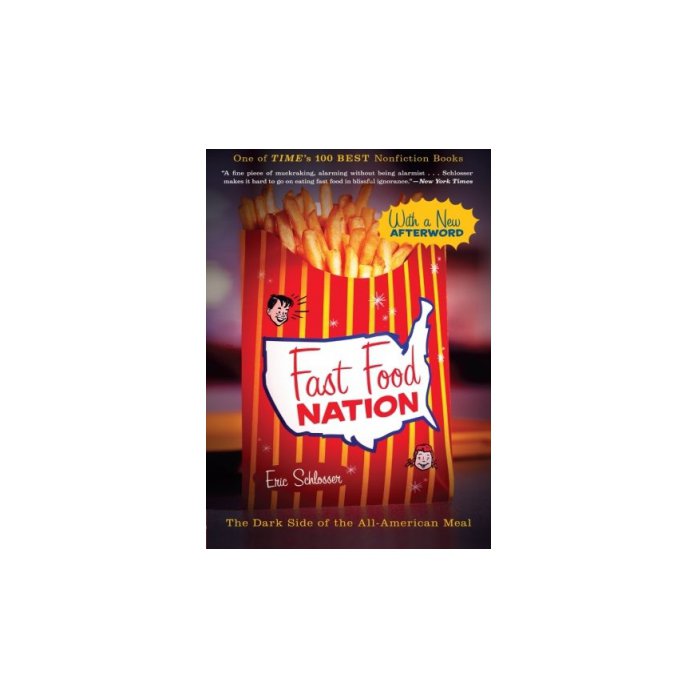A look at the fast food industry by eric schlosser – Delving into “A Look at the Fast Food Industry” by Eric Schlosser, we embark on a thought-provoking journey that unveils the complexities and consequences of this pervasive industry. Schlosser’s meticulous research and incisive analysis provide a comprehensive examination of fast food’s impact on our health, economy, and society.
This exploration begins with an overview of the industry’s history and evolution, tracing its origins and charting its remarkable growth. We delve into the production and consumption of fast food, scrutinizing the nutritional value, health implications, and environmental impact of this ubiquitous cuisine.
Fast Food Industry Overview

The fast food industry has become a ubiquitous part of modern society, shaping our eating habits and influencing our culture. Its origins can be traced back to the early 20th century, with the establishment of drive-in restaurants and the introduction of assembly-line production techniques.
Over the years, the industry has undergone significant growth and evolution, becoming a global phenomenon.
Today, the fast food industry is a multi-trillion-dollar enterprise, with major players such as McDonald’s, Burger King, and KFC dominating the market. These companies have expanded their reach across the globe, catering to the growing demand for convenient and affordable meals.
Fast Food Production and Consumption
The production of fast food involves a complex process that begins with sourcing ingredients from suppliers. These ingredients are then processed and prepared in central kitchens before being distributed to individual restaurants. The assembly-line approach to food preparation allows for rapid production, ensuring that customers can receive their meals quickly.
The nutritional value of fast food has been a subject of ongoing debate. While some fast food items may provide essential nutrients, others are high in calories, fat, and sodium. The regular consumption of fast food has been linked to an increased risk of obesity, heart disease, and other chronic health conditions.
In addition to its health implications, fast food production also has an environmental impact. The sourcing and processing of ingredients, as well as the disposal of packaging and waste, contribute to greenhouse gas emissions and resource depletion.
Fast Food Marketing and Advertising
Fast food companies employ a variety of marketing and advertising strategies to promote their products. These strategies often target children and young adults, using colorful imagery, catchy slogans, and celebrity endorsements. The goal of these campaigns is to create brand loyalty and drive sales.
Fast food marketing has been criticized for its potential to influence consumer behavior and dietary choices. Critics argue that the industry’s focus on unhealthy foods and aggressive advertising practices contribute to the obesity epidemic.
The ethical implications of fast food marketing, particularly targeting children, are also a concern. Critics argue that these practices exploit children’s vulnerability and contribute to unhealthy eating habits.
Fast Food Labor and Working Conditions, A look at the fast food industry by eric schlosser
The fast food industry is known for its low wages and limited benefits for its employees. Workers often face long hours, unpredictable schedules, and physically demanding tasks. The lack of unionization and the high turnover rate make it difficult for workers to improve their working conditions.
The challenges faced by fast food workers have led to increased activism and calls for better wages and working conditions. Unions and worker advocacy groups have been organizing protests and campaigns to raise awareness of these issues.
The impact of fast food employment on workers’ health and well-being is also a concern. Studies have shown that fast food workers are more likely to experience obesity, musculoskeletal disorders, and mental health problems.
Fast Food and Social Issues
The fast food industry has been implicated in a number of social issues, including obesity, health disparities, and community development. The consumption of fast food has been linked to an increased risk of obesity and related health problems, particularly in low-income communities.
Fast food companies have also been criticized for their practices in low-income communities. Critics argue that these companies often locate their restaurants in areas with limited access to healthy food options, contributing to food deserts and health disparities.
The ethical implications of fast food companies’ practices and their impact on society are also a concern. Critics argue that these companies prioritize profits over public health and contribute to social inequalities.
Q&A: A Look At The Fast Food Industry By Eric Schlosser
What are the major players in the fast food industry?
Schlosser identifies McDonald’s, Burger King, and Wendy’s as the dominant players in the industry, with a combined market share of over 50%.
How does fast food marketing target children?
Schlosser highlights the use of colorful packaging, toys, and celebrity endorsements to appeal to children, raising concerns about the ethical implications of such practices.
What are the health risks associated with fast food consumption?
Schlosser discusses the high levels of saturated fat, sodium, and sugar in fast food, linking them to increased risk of obesity, heart disease, and other chronic conditions.


